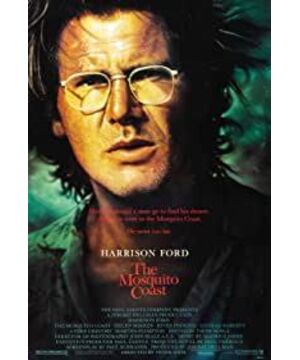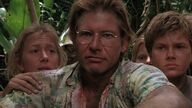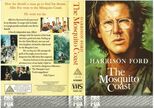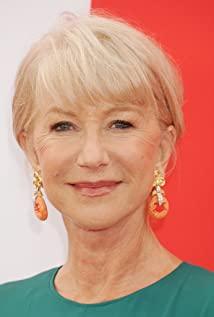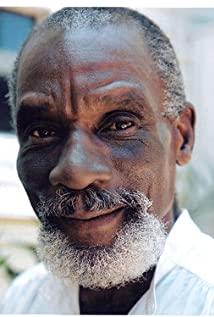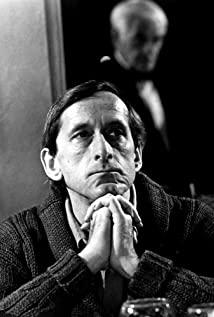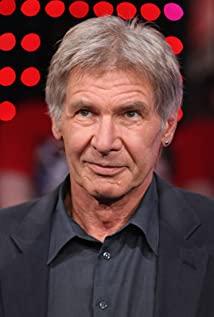In fact, looking back now, the reason for the failure of "Mosquito Coast" is also obvious. Will had the chance to make the long-shelved film after the success of "The Witness," which he shot the previous year, and earned him multiple Oscar nominations. Therefore, as films of the same period, "Mosquito Coast" and "The Witness" have many similarities, but they are far from each other in terms of film style. "The Witness" is more like a propositional composition under the Hollywood system, with a tense plot and an American-style bright ending, coupled with a heroic hero played by Harrison Ford, the success of "The Witness" is also a matter of course. Although Harrison Ford also plays the protagonist in "Mosquito Coast", the intense action scenes disappeared, and the plot became more open. Will lost the idyllic Amish imagination in "The Witness", but focused on the performance. The confrontation between traditional religious and technological forces is outstanding, but the fierce conflict is followed by the destruction of the homeland. If "The Witness" is a classic to reform the traditional genre, then "Mosquito Coast" is like an allegorical film with moral pessimism. There are many similar scenes and plot settings in the two films, but the way they are presented is completely different. "The Witness" and "Mosquito Shore" are both "father and son" themes, but the non-biological relationship in the former one is more warm to the audience than the actual parent-child relationship in the latter. In a family under Eli's patriarchy , the parent-child relationship is extremely complex. The construction of the barn in "The Witness" is one of the most beautiful scenes in the film, but the construction of the big ice-making machine "Fat Boy" in "Mosquito Coast" is accompanied by Elie's hysterical critique and world-weariness speech.
"Mosquito Coast" is adapted from Paul Theroux's novel of the same name. The prototype of the story basically continues the plot settings of classic literary works such as Conrad's "Heart of Darkness", Golding's "Lord of the Flies", and O'Neal's "King Jones". And the style of the video clearly shows Will's intention to pay tribute to Herzog's masterpiece "Aguirre, the Wrath of God". A cynical Harvard dropout, Eli, dislikes everything in the United States. He compares American society to a "steel jungle". Find a new world in the jungles of Honduras. The story of "Mosquito Coast" is a continuation of the classic mythology. The belief in his own technological rationality makes Eli believe that this more "advanced" civilization can surpass the primitive and barbaric civilization, and the unlimited development of high technology (the United States ) has deviated from the original intention of human instrumental rationality, which is the destruction of ancient values, so he fabricated a lie that the United States has been destroyed by nuclear weapons to deceive children who are gradually losing patience with primitive life. Eli demands absolute obedience from his family and the villagers of Geronimo, and will not tolerate any challenge to him, as Satan, who opposes God, and the God he believes in. To build a garden in a wild place, Eli is like Prometheus who stole the fire from the sky. Knowledge is regarded as the power to conquer all, and the enemy of knowledge and reason is the artificially created God and the powerful nature. The main conflict of Mosquito Coast revolves around Eli's rivalry with a Christian pastor, Byrgood, much like the theme of Paul Thomas Anderson's There Will Be Blood. The conflict between Eli and the priest also gradually transitioned from language to armed violence.
Eli's renovation project went well, and he created "Fat Boy", a giant ice machine that the local Aboriginal people worshipped (the "ice" in "One Hundred Years of Solitude" is also seen as a symbol of civilization invasion. ). In the frenzy of the residents, they gradually abandoned the God they once believed in and turned into a complete surrender to Eli's belief that "knowledge is power". "Fat Boy" is like a new pyramid totem, conveying an inviolable, invincible oracle. But Eli's ideas are not pure. While transforming the original territory, he also brought overly inflated ambition and arrogance. He tried to transport ice cubes to distant primitive tribes, but failed; he tried to use technology to change ignorance, but in the eyes of the villagers, he was still just a "missionary". In the war with the priest, Eli was able to cite the bible to defend his point of view, but in reality, the church and Eli's Geronimo were the same, they both used substance to deceive the people to gain the right to rule , both promised earthly and heavenly rewards for the obedience of the people. Eli's anger at the missionary was inseparable from his notion of the supremacy of technology. He wanted to transform the world, but the missionary asked people to endure the suffering from the world. Will responds to Eli's beliefs. As the village becomes more prosperous, the arrival of three robbers changes everything. Fearing the robber's gun (a symbol of technological alienation, in the parish church Balgood showed his video to the faithful, television was another technological alienation product), he started destroying houses, trying to Let the robbers go. But the robber refuses to give up this fertile land of paradise, and eats and drinks and even touches Eli's wife. Eli's murderous plan to keep the robber locked up in "Fat Boy" eventually led to the destruction of the village, and scenes of hellfire and doomsday are telling viewers that Eli's success is nothing more than a fragility built on chaotic nature Civilization, felling trees, polluting rivers, the power of knowledge mutated into a curse from hell. In contrast, when Eli's family passed through the parish of Belgood because of the storm, Eli took the opportunity to set fire to the parish, and the parish was also shrouded in hell fire. In the end, neither Christians nor pagans got the redemption they dreamed of.
Another thought-provoking theme of the film is the father-son relationship between Eli and Charlie. At the beginning of the film, we hear Charlie's narration, which runs throughout the film. Will implied from the beginning that the son is the ultimate narrator of the story, and that he has the right to speak about the meaning of the film. But for most of the film, Eli shows his absolute control. At the beginning of the film, Charlie said, "I grew up with the belief that the world belongs to my father, and everything he said was right." In Charlie's adoring eyes, his father also radiated the brilliance of an idol. Eli also sees Charlie as his confidant, and only the two of them know about the secret killing of the three intruders. But Charlie is not a submissive lamb. He is growing up and has his own ideas. In the process of transporting ice cubes, Charlie made a fire and was reprimanded by Eli for melting his ice cubes. After the village was engulfed in flames and the family was forced to drift on a stretch of sand, the children and mother were cheering and preparing to go back to the United States, but Eli was collecting scrap metal and starting to build their new beach by the sea. Life. At this time, the confrontation between Eli and his family was made clear by Will. Eli often appeared alone in the camera, while the other family members did not appear alone. The new home by the sea is unbearable for the younger son. Perhaps the freshness brought by the new world has been exhausted. After facing the torment of the storm again, the family has to ride a simple raft and drift aimlessly on the river. . The plot here is already very much like "Aguirre, God's Wrath" and "Apocalypse Now." At this point the family members even had some kind of hope for Eli's death, loyalty was exhausted, and when Eli found out they were going to lose him, he yelled "Traitor!". Eli is finally shot by Baiergood, and when only his head is still able to move, the son finally surpasses his father, frees himself from his father's creed, and seeks an independent self. The discussion of "patriarchy" in "Mosquito Coast" is actually a continuation of "The Witness", except that Harrison Ford's brave performance in "The Witness" is familiar to the audience, and he was also able to break through the traditional strict Arab Patriarchal control of the Mish, but in Mosquito Coast Harrison Ford is the object of the breach and the object of the audience’s dislike, and the young icon River Felix occupies the heart of the narrative Status, the audience is completely on the same page as Charlie, and we also have to make a moral choice, between the heavenly father and the biological father.
"God's perspective" big overhead shots constantly appear in the film. These aerial perspectives interestingly hint at Eli's fate of failure. It turns out that everything he fantasizes about is mercilessly swallowed up by nature and also by the audience's perspective. The end of the film is still a "God's perspective". After Eli died, the raft was still drifting alone, but the sea appeared ahead, and Charlie's voiceover "Now that he's gone, I can love him without any worries, the world seems to have become Infinite." Eli's exit is inevitable, he can't adapt to the real world, and the world can't tolerate his changing ways, Charlie can finally love his father as a person (no longer believe as a god), he Having conquered the sanctity and majesty of patriarchy, he will also begin to face a beautiful new world of his own.
View more about The Mosquito Coast reviews


